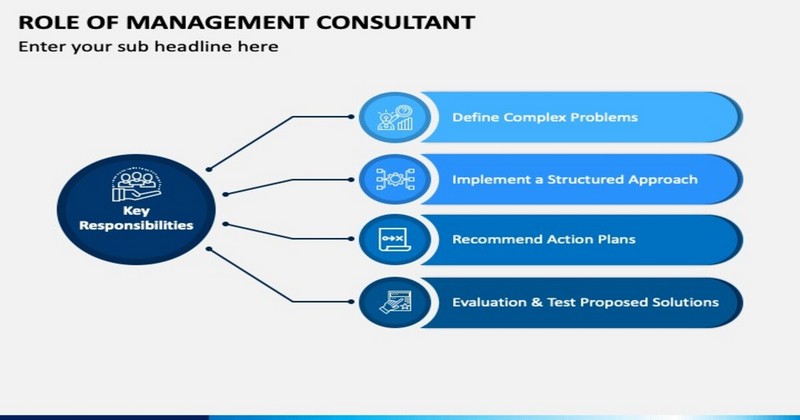The terms consultant vs independent contractor are often interchanged, but in fact, they are different. Consultants are experts who evaluate their client’s needs and develop insightful advice for any difficulties they face. On the other hand, a contractor evaluates requirements and applies their findings to support clients’ project workload.
However, the difference between consultant vs contractor is more than that. In this article, we compare a consultant vs a contractor, providing each role’s responsibilities so you can distinguish them better.

What Is A Consultant?
A consultant is an experienced professional with a wealth of knowledge and skills in a particular industry. Although self-employed, consultants may engage their services to advise on critical business objectives. They meet with the clients’ leadership team to gain insight into the project and develop a plan for its implementation.
Consultants are like problem solvers who offer expert guidance to enhance a company’s practices. Be aware that they will not operate the company but only advise strategies for companies to implement themselves.
Duties Of A Consultant
- Conducting Research and Analysis. Consultants use market research and tools to gather and analyze clients’ data. This helps them identify current problems or areas for improvement.
- Finding Solutions. Consultants use analysis to strategically craft solutions, design processes, products, or services, and develop comprehensive business plans for client success.
- Sharing Expertise and Guidance. Consultants leverage their expertise to provide valuable advice, share best practices from their industry experience, and keep clients up-to-date on the latest market trends.
- Providing Training and Coaching. Consultants often extend their services beyond simply offering solutions. They may offer employees or teams the necessary skills and knowledge to implement the solutions accurately.

See more: What Is Contingent Worker Meaning? In-Depth Explanation by HR Expert
What Is A Contractor?
Contractors are workers who organizations hire to perform specific tasks for a limited time. Since contractors are self-employed either as an independent contractor or via their own LLC and work for others for a committed fee, their contract ends only when they deliver the expected work. Businesses evaluate contractors based on their ability to perform a specific job and its demand.
However, what if your company wants to hire an independent contractor in other states? Misunderstandings about payment in this situation can lead to risks, such as legal penalties. EOR service from ERA can help you streamline paymentspayroll, mitigate employment-related risks, and ensure regulatory compliance.
Duties Of A Contractor
- Project Focus. Contractors’ primary function is to execute a specific task or project. For example, construction, IT system implementation, or running seasonal social media campaigns.
- Deliverables. They are responsible for completing the project within a set timeframe and according to agreed-upon specifications.
Key differences between consultants and contractors
If you are still confused on how to distinguish each role, below are 4 key differences between consultant vs contractor that business owners and workers need to remember.
Tasks Extent
Start with the difference between contractor vs consultant is the extent of tasks.
Contractors are hired to complete specific tasks or projects, such as building or developing. They often work in industries like construction, engineering, and technology. While they can provide advice related to their area of expertise, their main focus is on delivering a specific outcome.
Consultants, on the other hand, offer expert advice and guidance on a particular issue. They mostly work in industries such as management, finance, and marketing. Their ultimate goal is to give tailored developing strategies for organizations to step out of theirr difficulties and improve performance.

Working Hours
A contractor is a professional who works for a client on a contractual basis. The terms of their agreement typically include the hours required to complete the task based on the client’s requirements.
On the other hand, a consultant has no set work hours when providing their services. They take control of their workload and schedule while initially delivering clients’ goals that have been committed.

Rates and billing
Consultants usually charge their clients on a project basis based on their expertise and experience. They determine how long the project may take and how much to charge to ensure it’s worth their time and expertise. To own a client’s project, consultants often send a bid, a proposal outlining their approach and estimated cost.

On the other hand, contractors typically charge an hourly rate. The client hires them for a set time while they complete their project.
Final Thoughts
In short, both types of workers can provide valuable services but have different areas of expertise and perform different types of work. If you want to pursue these types of work, consider skills, knowledge, and preferences when deciding which career path to take. Remember, in whatever you do, take serious responsibility for each role, manage your time effectively, and respect clients’ perceptions.
Frequently Asked Questions
What Is The Difference Between A Consultant And A Contractor?
Consultants evaluate clients’ needs and provide expert advice, while contractors perform the work needed to meet those needs.
What Are The Roles Of Consultant?
Consultants take on projects, analyze situations, and give expert advice to address various needs. They gather data, create strategies, suggest solutions, and guide clients in specialized fields.
What Type Of Job Is A Consultant And Contractor?
Consultants evaluate a client’s needs and provide expert advice. Contractors and freelancers carry out the work. The engagement model used differentiates these roles.
Is A Contractor The Same As A Freelancer?
No. Freelancers and contractors differ in how they work. A contractor works full-time for one client, while a freelancer has their own space and works for multiple clients.
See more related articles
What Is Contractor Compliance?
What Is Contractor Compliance?
Understanding Contractor Workers’ Compensation
Contractor vs Subcontractor: How To Differentiate?
Difference Between Vendor vs Contractor: What Should Employers Know?
Freelancer vs Contractor: Understanding The Key Differences
Ms. Tracy has worked in human resource consulting for over 15 years. A driven entrepreneur focused on business expansion and people development. She previously worked as Country Manager for an international Australia firm that specializes in global workforce management, as well as several key roles as Business Growth Director and Executive Search Director for both large local firms to effectively drive their business growth. A strong emphasis is placed on aligning organizational priorities/objectives with business needs. She has a large network of local business leaders and a thorough understanding of the local market.









